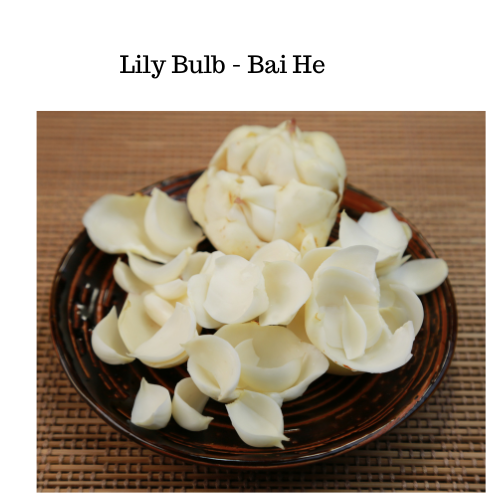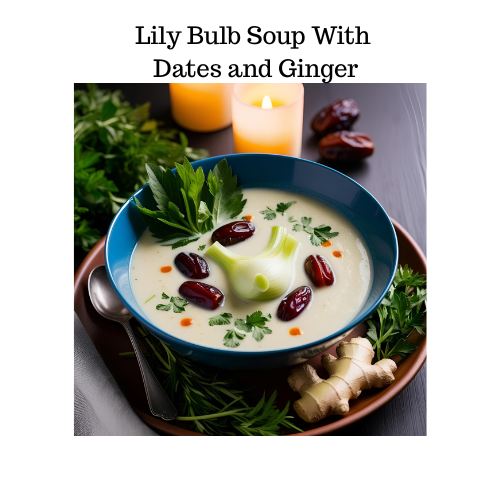

Welcome to our world of wellness—where tradition meets trust, and healing starts with a simple slice of something ancient, gentle, and remarkably powerful: Lily Bulb, known in Traditional Chinese Medicine (TCM) as Bai He.
You probably didn’t land on this page thinking, 'A dried flower bulb is exactly what I need for my dry cough, sleepless nights, and emotional ups and downs'—but here you are. And honestly, we’re glad you found us.
 What Is Lily Bulb (Bai He)?
What Is Lily Bulb (Bai He)?Let’s start with the basics. Lily Bulb comes from edible species of Lilium, carefully dried and used for centuries in Chinese herbal practice. It’s not the decorative floral bouquet variety (which is toxic), but a treasured herb that’s been soothing lungs, nourishing yin, and calming frazzled nerves for generations.
Chinese Name: Bai He (百合)
Botanical Name: Lilium brownii, Lilium lancifolium, etc.
Taste & Nature: Sweet, slightly bitter; cooling
Category: Tonify Yin, Clear Heat, Calm the Spirit
Long before wellness blogs, hashtags, and influencer tea trends, Bai He—also known as Lily Bulb—was already a staple in both the kitchens and healing halls of ancient China. This humble bulb wasn’t just food or medicine—it was a bridge between the body and the spirit.
In Traditional Chinese Medicine, Bai He was often prescribed for people suffering from persistent dry coughs, emotional restlessness, or what was known as 'Heart and Lung yin deficiency'—a condition tied not only to physical depletion but also to deep emotional grief or heartbreak. Healers understood that the body doesn't heal in isolation. When the lungs were dry and the spirit was heavy, Bai He was the herb called upon to restore both breath and balance.
Historical records and herbal classics mention Bai He being used for “calming the Shen” (the spirit), cooling internal heat, and soothing the chest—especially during times of prolonged sorrow or after illness. It was a symbol of comfort, often simmered into soups for widows, convalescents, and those facing the long road back from emotional collapse.
So next time you sip a warm cup of lily bulb tea, know that you’re not just enjoying a soothing herbal infusion—you’re participating in a ritual that’s offered emotional and respiratory healing for over a thousand years. It’s more than tradition; it’s connection.
You know the feeling: tired but wired, coughing from dry heat or post-viral irritation, emotions fraying at the seams. Lily Bulb doesn’t come in with a sledgehammer—it offers soft strength. It restores, moistens, and settles, like a sigh you didn’t realize you needed.
| Traditional Benefit | What That Means Today |
|---|---|
| Moistens Lung Yin | Relieves dry cough, throat irritation, and post-smoke recovery |
| Calms Shen (Spirit) | Soothes anxiety, emotional exhaustion, grief |
| Clears Heart Heat | Helps restlessness, overthinking, and poor sleep |
| Nourishes Yin | Cools the body and supports post-illness recovery |
 What the Science Is Saying
What the Science Is SayingModern research supports what traditional healers long observed. Lily Bulb contains flavonoids, alkaloids, and saponins that may support:
Mild sedative effects (without next-day grogginess)
Antioxidant activity
Neuroprotective and lung-soothing effects
A 2017 Journal of Ethnopharmacology study even showed measurable anti-anxiety properties in extracts of Lilium species.
Let’s face it—prepping herbs can feel intimidating. But lily bulbs? They're pretty low drama.
Think of preparing them like prepping for a first date:
Rinse well, dress them up (maybe with a bit of ginger), and don’t forget to make them comfortable—aka, a warm bath in your soup pot.
| Form | How to Use |
|---|---|
| Dried Slices | Simmer 10–15g in soups or teas—delicious with pear and a hint of rock sugar |
| Powdered Herb | Add 1–2 tsp to smoothies or warm drinks |
| Classic Congee | Combine with rice, goji berries, and ginger for a comforting wellness bowl |
| DIY Skincare | Grind with honey into a paste for soothing skin masks or minor cuts |
Pro Tip: Don’t expect fireworks on day one—Bai He is more of a long walk, not a sprint. Within a few days, you’ll likely notice better sleep, less irritation, and yes, maybe even a little more emotional ease.
Check out our page on How To Use Herbs
Ingredients
10g dried lily bulb
1/2 sliced Asian pear (optional)
1 tsp goji berries (optional)
2 cups water
Honey (to taste)
Instructions
Rinse lily bulbs thoroughly to remove dust and debris.
Combine ingredients in a pot and bring to a boil.
Simmer gently for 20–30 minutes.
Strain and enjoy warm with honey.
Drink once daily, especially before bed.

Ingredients:
10g lily bulb slices
1 pear, sliced
2 slices fresh ginger
6 red dates
Optional: 1 tbsp snow fungus or tremella
4 cups water
Benefits: Great for post-illness dryness, smokers’ lungs, and fall-winter yin deficiency.
Want to discover even more ways to use Lily Bulb in your daily routine? Send us an email, and we’ll share 5–10 easy, everyday recipes that make this traditional herb both healing and delicious. Use our contact us page
While lily bulb is gentle, it isn’t for every constitution.
| Not Ideal For | Why |
|---|---|
| Cold/damp digestive types | May feel too cooling or slow digestion |
| People with heavy mucus or phlegm | Can aggravate phlegm-based conditions |
| Pregnant/nursing individuals without supervision | Best to consult a practitioner first |
| Anyone on sedatives or anti-anxiety meds | May have additive calming effects |
Q: Is this the same lily from flower shops?
No. Medicinal lily bulbs come from edible species grown specifically for healing.
Q: How long until I feel something?
Most people notice better sleep, improved breathing, or calm within 3–7 days.
Q: Can I take it every day?
Yes! In traditional kitchens, Bai He is consumed like food—especially in seasonal soups.
Q: Will it make me drowsy?
Not during the day. It gently prepares the body for rest—it doesn't knock you out.
“In Chinese herbal clinical practice, Bai He is prescribed for patients with emotional restlessness, chronic dry cough, and sometimes even post-menopausal symptoms. Its action on the Heart and Lung meridians makes it uniquely suited for the intersection of emotion and respiration.”
— Dr. M. Liu, DACM, L.Ac
Not all herbs that support the lungs or calm the mind work in the same way. Here's how Lily Bulb (Bai He) stacks up against other commonly used Traditional Chinese Medicine herbs in terms of purpose and best use:
| Herb | Primary Focus | Ideal For |
|---|---|---|
| Lily Bulb (Bai He) | Moistens lungs, soothes emotions, supports sleep | Emotional stress, dry cough, post-illness fatigue |
| Mai Men Dong | Deeply nourishes lung and stomach yin | Persistent dry throat, irritability, yin deficiency |
| Suan Zao Ren | Calms the spirit, nourishes the Heart | Difficulty falling asleep, overthinking, night sweats |
Choosing the right herb depends on your specific pattern and goals. Bai He is especially well-suited for those needing gentle emotional grounding combined with respiratory support—without the heaviness or sedation of stronger herbs.
We source premium-grade lily bulbs from high-altitude farms in Yunnan and Gansu, China—regions celebrated for their pristine growing conditions. Every batch is:
Geo-authenticated
Third-party tested (pesticides, microbes, heavy metals)
Packaged fresh and practitioner-approved
Available as dried slices, powder, or in formula blends
We’re not just here to sell herbs—we’re here to reconnect you to real healing. And if you’ve made it this far, you’re likely ready for more than just another supplement. You’re ready for something rooted, real, and restorative.
Lily Bulb may not scream for attention—but that’s kind of the point. It whispers where other herbs shout. It restores rather than pushes. And it invites you to take a breath (literally and emotionally) when life has taken too much.
So whether you’re healing from a cold, riding out a tough emotional patch, or simply looking for deeper rest—Bai He has a place in your kitchen, and in your journey.
See All Forms Of Bai He - Lily Bulb Below

A study published in Heliyon discusses the traditional use of Bai He in treating "Lily disease," a condition resembling modern-day depression. The research highlights the effectiveness of Bai He in nourishing Yin and clearing heat, contributing to emotional well-being. PubMed
Research in Metabolic Brain Disease indicates that extracts from Lilium brownii bulbs exhibit neuroprotective properties, potentially benefiting conditions like Parkinson's disease by improving motor function and reducing oxidative stress. PubMed
A study in the Journal of Food Science found that Korean Lilium lancifolium bulb extracts possess significant antioxidant and anti-inflammatory effects, suggesting their potential as functional food ingredients. PubMed
The Bailemian capsule, containing lily bulb among other herbs, has been studied for its efficacy in treating insomnia. Findings suggest that it may improve sleep quality by modulating neurotransmitter pathways. PubMed
Research in the Journal of Ethnopharmacology highlights the wound-healing properties of steroidal glycoalkaloids extracted from Easter lily bulbs, demonstrating their potential in promoting skin regeneration. PubMed+2PubMed+2PubMed+2